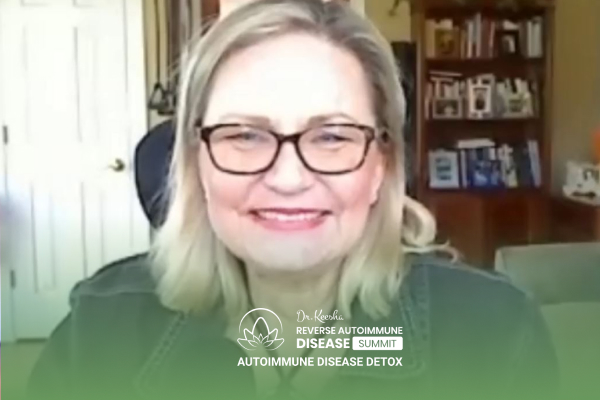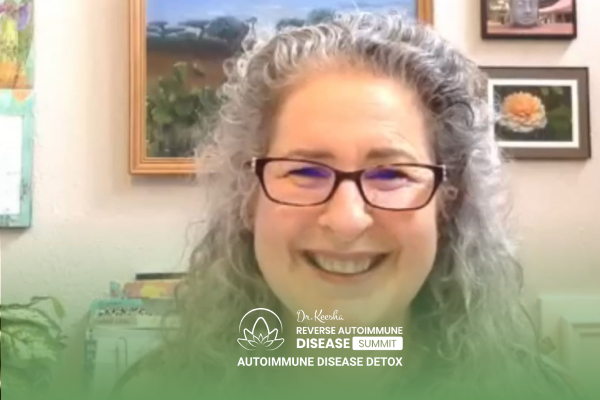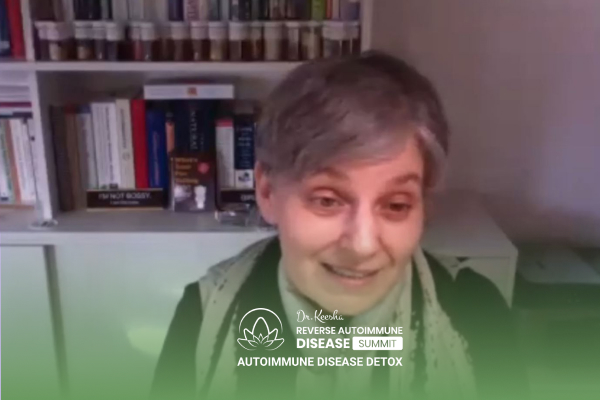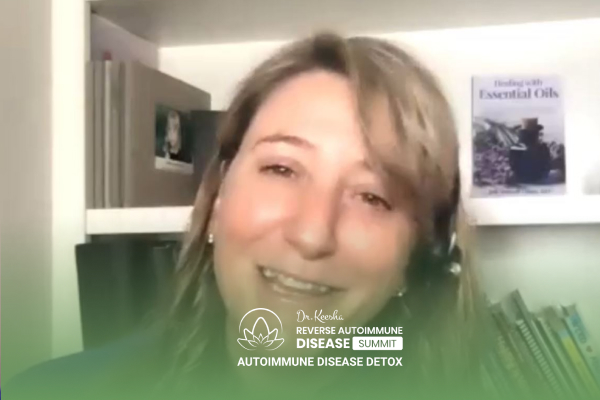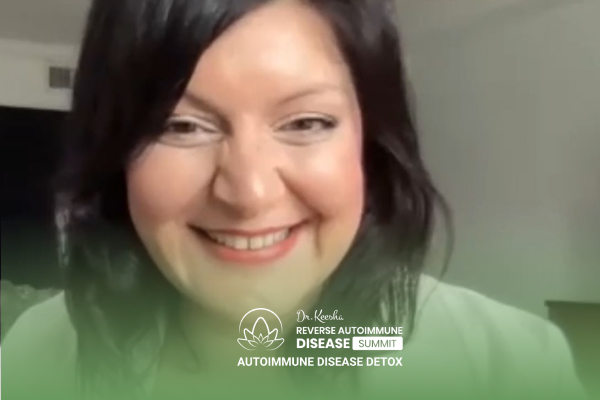Join the discussion below
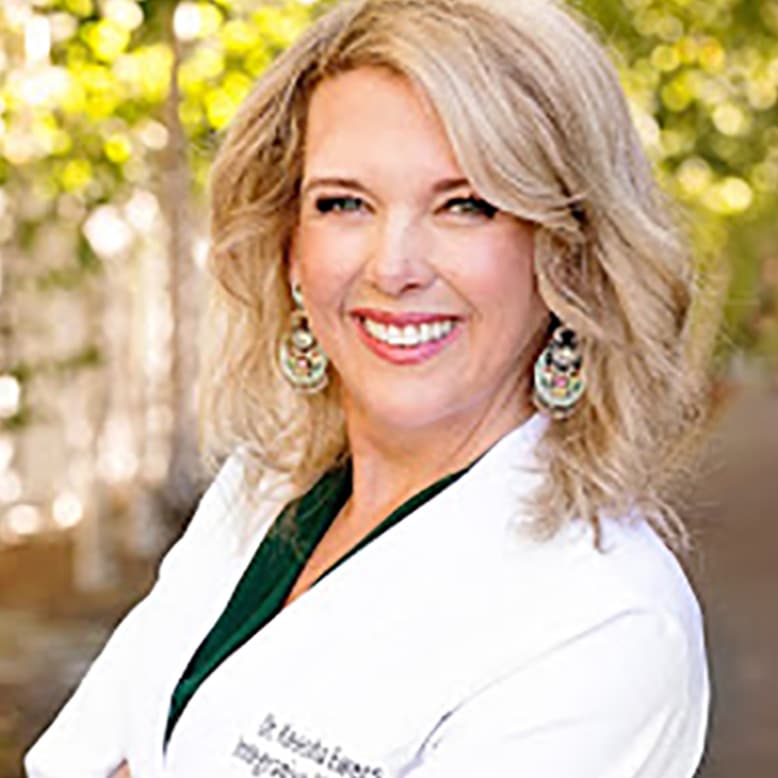
Keesha Ewers, PhD, ARNP-FNP-C, AAP, IFM-C
Dr. Keesha Ewers is an integrative medicine expert, Doctor of Sexology, Family Practice ARNP, Psychotherapist, herbalist, is board certified in functional medicine and Ayurvedic medicine, and is the founder and medical director of the Academy for Integrative Medicine Health Coach Certification Program. Dr. Keesha has been in the medical field... Read More
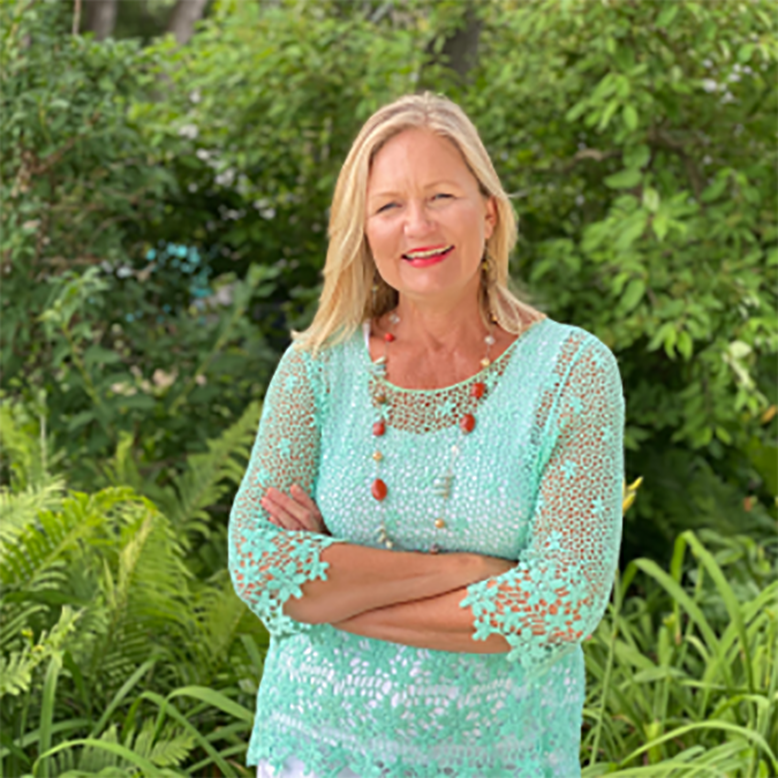
Katana Abbott, is a Retirement Reinvention Coach, Certified Financial Planner, host of Smart Women Talk Radio and the founder of Smart Women's Empowerment. For 30 years, Katana has inspired women 50+ to thrive by finding their purpose, creating lifetime income, launching encore careers and preparing for the unexpected. She loves... Read More
• The most important part of your home to detox
• The vital role toxic burden plays in autoimmunity
• The best resources to make a total home detox simple and stress-free
Related Topics
Money MattersKeesha Ewers, PhD, ARNP-FNP-C, AAP, IFM-C
Welcome back to The Reverse Autoimmune Disease Summit series everybody. Of course, you’re joining us for the autoimmune detox, which is the fourth iteration of The Reverse Autoimmune Disease Summit. I’m talking about all different kinds of detoxification when I’m talking about the autoimmune detox. Things that are toxins in our lives that we may not even be aware of, and may be getting in the way of happiness and abundance as well as health. So my guest today is going to be talking to that. We’re going to be talking about detoxing your money story, how to create abundance within and without. Katana Abbott, really sweet friend of mine, is a retirement reinvention coach, certified financial planner, host of Smart Women Talk Radio, and the founder of Smart Women’s Empowerment. For 30 years Katana has inspired women 50 and over to thrive by finding their purpose, creating lifetime income, launching Encore careers, and preparing for the unexpected. She loves helping women create the third act of their dreams and believes this smart woman doesn’t retire, she simply reinvents. Welcome to the series, Katana.
Katana Abbott, CFP
I’m really excited to be here. Thanks for having me.
Keesha Ewers, PhD, ARNP-FNP-C, AAP, IFM-C
So you have a very compelling life story. We’ve talked about it before and trauma is one of the things I talk a lot about and how it impacts our health. We have health that is in these arenas of financial health, physical health, relationship health. We’re going to be talking a little bit about that financial health, but there’s a saying that says, how you do one thing is how you do everything. So I know this might be sort of like a why is she talking about in an autoimmune summit, finances. I’m just trying to bring this to people that toxicity comes in so many different ways and shapes and forms and places where you might be struggling with your health. Actually, you might be struggling in other areas for the same exact mental blocks. So let’s talk about a little bit about your story where you came from that has you doing what you do today?
Katana Abbott, CFP
Absolutely. Thank you. So what you just said about how money affects our health everyone knows this. Everyone knows that money affects our health but I really believe it’s our experiences that really affect our health. Anne Bancroft has a quote that I just love. And she says, the things we overcome in life really become our strength. I believe this, and I don’t think this is some kind of random thing. All these things that happen to us. I really believe that, even when I look back at my life. I’ll share you share just a little bit about it, but when look back at it, the good and the bad, I really see that it was all perfect, the good and the bad. It was part of this journey that I’m supposed to be on.
It’s the journey I’m supposed to be on to do what I do today and I’m getting goosebumps when I talk about it, I actually get kind of excited even though the story’s horrible. I hope that those are listening or watching, when I’m talking today keep thinking about yourself and think about your own story. So by the time I was 20 years old I had already experienced, death and divorce and abuse, financial abuse, and that’s why I’ve come into this work. My father died when I was six. My mom had no idea what to do. She was left with three kids under six years old he had drowned and it was during the Vietnam war. So she took that money and she bought a house, paid cash for it, but she wanted someone to take care of her. She wanted her Prince charming, she ended up with a monster. So there were 10 years of abuse, financial abuse and a lot of other stuff, bad. At the end of that 10 year period though she had lost the house, he had sold it and taking the money and then she had breast cancer. Right at that time I was going through my own nightmare. What I want to point out here is, again, these experiences, we start thinking that they’re true, even though they’re not. So, quite often we go back to the familiar.
So I went back to what I knew and I married my own monster. The thing is that all of us have these feelings of intuition, which is our soul and then fear. So in my case, I knew in my heart that he was bad just by things he was doing, but I thought I could change him, so I married him anyway. So, within that first year, it was again, total nightmare. He ended up, he just wanted his green card and I ended up, he ended up putting me in the hospital and here’s the thing. He came to the courthouse where I had criminal charges against him and immigration was there and he jumped in the car and he threatened to track me down and kill me. So I didn’t even go to court about this. That’s how scared I was. So where in your life are you hiding? What could have, how could my life have been different? Had I somehow, and I try to play it in my mind, and walk up those steps and show up in that courthouse and confront him.
So at that point I didn’t, but I will share that again, this idea of being on this journey and having guardian angels and being on a path, where all of this is for you, I read Think and Grow Rich by Napoleon Hill. I don’t even know where it came from and a light bulb went off. I said, he talked about burning desire, and mine was I’ll never be a victim again. So I started on a path of personal development from then on, and it hasn’t stopped. I’ve spent, I don’t even want to say how much, like a master’s degree at a really expensive university I know so many here, are doing the same thing, but it changed everything.
It gave me tools, so I could move forward. But there’s this there’s this, So now I just want to share, I live on a, my mom ended up with a wonderful husband and a great life. I want to share that, she got remarried and it was a love story. It was great. Then I met my Prince Charming and he really was he came in to bought a car from me and we’ve been married 35 years. We live in a Lake and we have a great life. But for my career, I have been focused on education. He goes, can’t you stop teaching? Can’t you stop? I said, no, it’s just, I can’t help it. So I’m a teacher and I want to help women stand in their power with money. That is just I guess my purpose in life. So all of us, we have this purpose and we may not know it. I’m going to give you a tip, you can do, it’s very easy.
Sit down with a piece of paper and just go back to your beginning of your life and break it up into decades, and do a zero to 10, 10 to 20, 20 to 30, and write it like a, write down, who were the characters? What was the experience? What happened? What was the theme, and then go to the next one and then go to the next one, go to the next one and then go back and say, what were the lessons for each time? So that’s the key. When something happens good or bad find out what the lesson was, what did you learn from it? Do it for all of that, and I promise you, you’re going to find the gift. Or the very first thing I said, because you’re going to go, Oh my goodness, if that didn’t happen, this wouldn’t have happened. And then that person, even though all these bad things happened, you’re gonna, I promise you, you’re going to be able to heal through that. So it’s a great exercise. I just call it a decades exercise, but is really great for healing.
Keesha Ewers, PhD, ARNP-FNP-C, AAP, IFM-C
That’s beautiful. I know you did a survey of women and you asked what’s your single biggest financial challenge. I’d love to hear what their results were.
Katana Abbott, CFP
Okay. So you let me know what you think. If this is what you would have guessed, but we’ve had 229 women that have taken the survey. Which is a nice number, and interesting, 68% are over 50. So, there’s this demographic that we’re reaching. Then, I didn’t know we were going to reach that demographic but that’s who we’re attracting. So the number one financial challenge, and I had listed in the survey, maybe six different things and they could pick any that they want, or as many.
Keesha Ewers, PhD, ARNP-FNP-C, AAP, IFM-C
What are the six?
Katana Abbott, CFP
I don’t have them all in front of me. I think, I thought, but the number one was they said this, eliminating self limiting beliefs false beliefs, self doubt. They knew it. Number two was earning enough. Now, how related are these?
Keesha Ewers, PhD, ARNP-FNP-C, AAP, IFM-C
Yup.
Katana Abbott, CFP
If you have these beliefs like I’m not good enough, you’re going to undercharge. You might be afraid to launch something, or to accept a speaking engagement. If you don’t, that’s the huge one. So I think they really nailed it. The second thing we said then, what were your goals? The number one, ease and joy, creating more ease and joy in my life. So it wasn’t to make money. I’ll bet you with men it’s going to be, make more money. But with women the second one was to retire with enough money because we all know at some point we need to replace the income that we’re earning.
Now, more women are working later, way later, but creating more ease and joy. So we’re going to talk about that today because there’s another study by Fidelity, it’s called the fit study. They said that half the women that have a money manager, So these are women that have money, maybe in a 401k or an IRA or a brokerage account, or they inherited something. They 50% have not even talked to the advisor. When asked why they’re uncomfortable about talking about money. The second thing they asked about the biggest roadblock and they said that they had, they found that there was a lack of confidence and it’s too personal.
So I realized when I do a money course, I have a course, Money, Drama, Breakthrough that I did years ago. With that course, we do not start out with budgets, or debt. We start out with your money story and finding out what I just did with the decades to find out your belief system. That’s really where we need to start, because the key to all of this, as you’ll find, is going to be our beliefs, and our money beliefs, and just our beliefs about ourselves.
Keesha Ewers, PhD, ARNP-FNP-C, AAP, IFM-C
Well, along with that money story, you talk about five money personalities. I would love to hear more about that because I guess, those beliefs are going to inform your personality. I have the hurt model, the healing and resolve trauma model that came from my study when I was in my PhD program in 2013. One of the things that I talk about is that that old trauma, you actually, it’s not about the trauma it’s the meaning and the belief that you have as a result of it, that you made up with your brain that’s not fully developed yet in childhood. Then at the age of 26, you finally have a fully developed brain but you also have this belief system already in place. Unless you really intentionally go back and start taking a look at it, it’ll just stay there and inform you for the rest of your life. So an upset six year old couldn’t be driving your car right? So it’s an important piece around money too. I would love to hear about these five money personalities.
Katana Abbott, CFP
Well, I’ll share a minute, I’ll hit all of them and maybe just give an example, a real quick example of each one and how I’ve seen them play out. I want you to know when I say these things and if you recognize yourself it doesn’t mean that these are negative. These are things that happen because of the things you heard or saw or witnessed. All of us can take this and turn it around, and stand in our power with these. But this is the best thing is look at the symptoms, right? What are you seeing? So, yeah, so there’s five, and when I say them see if any of just the words, when I say them, if any of them trigger you, and as we’re going through this, maybe write a little note. And I will say I’m giving everyone my book, The Five Biggest Money Mistakes Women Make and How to Fix Them. There’s a chapter, and the chapter is called why would you let a six year old run your life, Or something like that. That’s what’s happening is our little girl was running it. So love, security, value, status, recognition. Any of those seem, like jump out at you.
Keesha Ewers, PhD, ARNP-FNP-C, AAP, IFM-C
Yeah. So love is, I think you and I have done this before because I’ve been on some of your programs before and we can have a combination of two also, right?
Katana Abbott, CFP
Yeah. Be one that’s primary.
Keesha Ewers, PhD, ARNP-FNP-C, AAP, IFM-C
Love is my prime one.
Katana Abbott, CFP
Okay.
Keesha Ewers, PhD, ARNP-FNP-C, AAP, IFM-C
Yeah.
Katana Abbott, CFP
So let’s see. So the desire with love is belonging. The challenge is self-acceptance. So how this shows up is there’s a belief and it could happen anyway, but I need to do whatever it takes to get love. So the way this shows up, so again, the symptoms would be over spending and usually it’s to fill a hole in the heart they’re feeling like there’s something missing. So they’re filling this hole in their heart.
Keesha Ewers, PhD, ARNP-FNP-C, AAP, IFM-C
It’s a perceived hole, everybody, it’s not really a hole.
Katana Abbott, CFP
I had a talk with someone yesterday, who has a real hole in her heart, too.
Keesha Ewers, PhD, ARNP-FNP-C, AAP, IFM-C
But I mean, what that money you think is going to fill. It’s a perceived hole.
Katana Abbott, CFP
Oh yeah. Right, right. They can even, and one of my clients actually called it monopoly money because they feel like, there’s always more where that came from. If there’s debt it’s just going to work its way out some way. Well, because of this belief, these women who I’ve worked with often build up debt and even file bankruptcy. So I was working with one woman and a group of young people and she was a love personality. Because I did the session for her, and she had all this makeup and all this jewelry, and all these clothes, just like real extravagant. She told me we figured out she was a love personality and she was about to go bankrupt.
So I always have someone that person I’ll have them state what that belief is, and then go to where it is in their body. Then we’ll close our eyes and they will go right to that experience. The first time you go through this it’s really good to do that. So hers was when she was little and wanting something like McDonald’s from her mom. Oh, her aunt said, no, you don’t need that. Your mom can’t afford it. Her mother said, of course I can afford it. She got it for her. When she realized that she was, Oh my gosh, I’m doing that to my son. See how that happens. So then when I talked to her the next time after we did this she was really working on changing the whole thing. It was really great. I was excited for her.
Keesha Ewers, PhD, ARNP-FNP-C, AAP, IFM-C
I’ve worked on it over the last 20 years and it’s no longer a problem, but I definitely used to run. I don’t anymore. I don’t have any debt, but I used to run high credit card debt. When I was in my twenties, I was definitely, in that space. I had to really evaluate it and take a look at it and realize its pattern, I was running. It wasn’t who I was.
Katana Abbott, CFP
You gotta find healthy ways, right. Healthy ways to feed your soul that way.
Keesha Ewers, PhD, ARNP-FNP-C, AAP, IFM-C
Right, it’s the same with when somebody chooses food to fill that space or, it’s like shopping, food, porn gambling, sex, drugs, alcohol, it’s the same thing.
Katana Abbott, CFP
They’re all addictions.
Keesha Ewers, PhD, ARNP-FNP-C, AAP, IFM-C
They’re all that seeking, because you think there’s something that it’s going to fill, and it’s not true. So my viewers have seen me flash this picture a lot. I keep this little picture by my computer. Right. Yeah. So it’s like keep that little one next to you. When she’s feeling abandoned or feeling upset or feeling like there’s something wrong that something outside is going to fix, you go to her. You don’t go to Amazon you go to her and pick her up. I still have, I have to say and I told my husband, when we got married. I said, the thing I spend my money on these days is books, travel and education. I have a very, very wide and diverse library. So I allow that, I just go, okay, books are what I buy now. It’s not like buying something that’s going to put you into bankruptcy. So I choose what I want to–
Katana Abbott, CFP
Like self-improvement.
Keesha Ewers, PhD, ARNP-FNP-C, AAP, IFM-C
Yeah. Well, there are all kinds like Tibetan Buddhism and spirituality, just all kinds–
Katana Abbott, CFP
By purchasing you’re educating yourself.
Keesha Ewers, PhD, ARNP-FNP-C, AAP, IFM-C
Yeah, exactly. Yeah. Yeah.
Katana Abbott, CFP
Well, it’s better than bottles of wine.
Keesha Ewers, PhD, ARNP-FNP-C, AAP, IFM-C
Instead of clothes, things, jewelry or things like that. Yeah, exactly. So books are my thing.
Katana Abbott, CFP
Well, the second personality is that I want to cover is security. So this is not the opposite of love, but it sounds like it might be because the desire is freedom. My husband’s a security personality. He’s always talking about, he wants to retire. He wants to retire so we can have freedom but then his challenge is trust. So you want freedom, but then you don’t trust anyone. You don’t trust anything. So the belief is, I never know when what I have could be taken from me. It could be love money, job, or it could even be money, people, career, that kind of thing.
So how it shows up is hoarding and self denial and overshot, over thinking purchases. So it’s the opposite. Your thinking is mine. This is the other thing I want you to think about. If this is a spouse, then you have to look at, how can you bless each other? So this security personality, if you’re married to one of these other personalities when you can sit down and share side by side, that I did it with my husband, cause I’m a recognition. So I take these pie in the sky ideas and take a lot of risks and it used to freak him out. Now we’ll sit down in advance and talk about it. Before when I would try to talk about it, he would shut her down, and then I would get mad thinking, he doesn’t want to even hear my idea. No, because he was scared I would do it. Did that makes sense?
Keesha Ewers, PhD, ARNP-FNP-C, AAP, IFM-C
Yep, that’s exactly my husband.
Katana Abbott, CFP
So the value personality is the next one. I have a really good friend that’s value. So I get to see this played out in family members. The desire is significance. The challenge here is setting boundaries. So if you know someone has a really hard time with it and because they’re trying to prove that they’re good enough, sometimes even a good person. So of course, that’s going to be over-giving, being taken advantage of, helping people out, even if you have to borrow it from your credit card, going into debt for others. You know, it can again be very detrimental because you could end up in a lot of debt and no savings.
Then again, that whole self-worth about not good enough. That’s huge, huge. So all of us, there are a lot of us, as women. We can still have a little bit of that value. So I actually do these sessions with people and then I have exercises they can do, and empowering words that are good for that person. When you have a status person they want to be validated and the challenge is balance. So they’re go, go, go, go, go all the time. The belief is that whatever I achieve or whatever I have, it’s never enough. It’s almost that gluttony in Enneagram.
Keesha Ewers, PhD, ARNP-FNP-C, AAP, IFM-C
The eight.
Katana Abbott, CFP
Number eight. So it shows up compulsively spending, picking up the tab, even when you can’t afford it, but having to have the newest and best thing. So I know someone who has a fancy sedan, a big pickup truck, a motorcycle and a sports car. So that’s an example and he can definitely afford it, but I mean it’s just this idea of just not enough and nothing ever satisfies. Do you see how that could happen? It’s a lot of time an over powering parent that you’re trying to live up to, that’s when we go into the back. So the last is a lot of entrepreneurs will find themselves as a recognition personality.
So they want respect, but then what sabotages that is their challenge is realism. So they come up with these, pie in the sky ideas, like a lot of entrepreneurs, like going to the moon, going to Mars, right? So they feel their belief is I need to prove I’m right or that I can do it. A lot of times it’s doing it on their own because of a belief that they experienced they had where they didn’t get supported and something horrible happened when they were a kid. So now they have these ideas of how they can make the world better. They can improve their life. They never give up always looking for the big win. So there’s a three-step process when you’re looking at these and if it’s Enneagram or if it’s money, personality. You want to identify what that belief is. Boy, when you believe, when you understand what that is, you want to release it. So I’m just going to tell you what you can do would be great to have someone with you who knows tapping who knows breath work, who could help you through this.
But when you realize what that belief is you want to say it out loud and close your eyes and see where you feel it in your body. You’re going to see it could be your throat, it could be in your heart, mine is always down in my stomach. As soon as you notice that then what you want to do is close your eyes. If you can go to, where was I when I first felt bad feeling in my body, and it will take them to an experience, it’s like magic. When they go there, then they can see what caused it. The first thing they better do is, they’ll see themself as a little girl. I always say, get her out of there. Take her to safety and then do inner child, Breath work, blow out candles, do something to shift that energy.
Let your little girl knows she’s loved. She’s saved. Thank her for what she’s gone through and tell her what to look forward to. That’s you got to calm that little girl down and let her know, and it sounds really crazy. But when you release that, you’re gonna, especially I do breath work. and if the energy moves up your throat and out of your head, that means you were angry. If it moves down, down, down, it’s either going to more than likely be resentment or it might be regret. So just play with that. If anyone wants to, I can actually do a session with them and take them through that. I know you do this kind of work too which I always felt so close to you because yours was based on sexual repression even, in problem we have in our life that way.
Keesha Ewers, PhD, ARNP-FNP-C, AAP, IFM-C
Yeah. Any trauma, but yeah, a lot of sexual. Yeah. Yeah.
Katana Abbott, CFP
No, but the last step I just want to make sure is, create an action plan that create new beliefs, gets support. There’s so many things you can do but deal with that stuff first. Then you can start working on the debt or say I’m not going to shop anymore because you now understand where it’s coming from. It’ll be a little bit of work but there’s definitely help out there for everybody that’s going through that.
Keesha Ewers, PhD, ARNP-FNP-C, AAP, IFM-C
Yeah. This is important. I remember, because my husband is a security type and I’m a love type, which is the security type is often a five or a six on the Enneagram. The love type is often a two on the Enneagram and they don’t sync alike, at all. They don’t perceive the world. They world view’s different. Everything is different, not just their spending habits and the way that they are in relationship with money. I remember him saying you have a disease and you need to get help. I just sat him down and I said, honey, this is actually, I warned you. We got married, I buy books. I have a library that I really like. So this idea that you have, you need to try and take a look and everything. We have plenty of money.
We are kind of the thing you were just saying there’s always plenty money, but really look at our spreadsheets, really look at what’s going on here because sometimes the security type can get wound into this projections of fear, right? Just like the love type can get wound up into not looking at anything and wind up in debt. And so, we got on this really amazing, in this space where we could talk to each other, and we could, I could say, okay, let’s look at the numbers. So I know where we’re at. And so, you know where we’re at. Now we have these goals that we’re meeting and we are meeting them and we’re, so that you can bring your language together because boy, a security and a love are about as far apart as you can get.
Katana Abbott, CFP
Yeah. That’s why I said they’re not really opposites but in a way they are.
Keesha Ewers, PhD, ARNP-FNP-C, AAP, IFM-C
Yeah.
Katana Abbott, CFP
The same thing with the security and the recognition, because you got the security person and the risk person here to go try things. Hmm. Excuse me. So with my husband and me, here’s an example. Cause you know, then you want to take this now like you just did and look at it, how is it showing up in our life? So my husband wants to retire in three years. He’ll be 60, I’ll be 65 and he won’t have Medicare. He’ll get his pension early, but there’s a big gap in income until all the other things. We had another pension and he’ll have to get social security all those things that kick in. So I’m looking at how do I make all of this work? So his big fear was we had this like $2,700 a month house payment.
I’m going, yeah, but we’re going to get that thing paid off in 10 years, we refinanced for 15 years. He just was really uncomfortable with that. SO you had my risk thing, Yes, we can do it, I’ll figure it out. So instead he refinanced and we also pulled 30,000 out and did all the things that were driving me crazy in the house. He did them himself. Because he’s not working, with people he hired, he’s like helping them. So he felt really good because he saving money and doing himself and learning. But the big thing we did, he actually did it. We talked about it. He refinanced, he pulled the cash out refinance for 3%.
Like we have before for 30 years the payment went to 970. Now he’s like, we can’t live anywhere in the world this cheap. Now, I’m so happy. So we’re still putting this money aside but now we’re giving it to the financial advisor to invest. So we’ll have that option because he wanted to have the cash in the low payment. So when you can deal with these what I’m trying to share is then you can sit down and make really smart choices where everyone’s happy and you can sleep at night, again, there’s so many people in getting divorced and fighting over money. And really if they could just learn where this is coming from a lot of it is just false beliefs or emotions and that you can’t even get to the solutions.
Keesha Ewers, PhD, ARNP-FNP-C, AAP, IFM-C
Right? Yeah. That’s really good advice. There’s a saying that, millionaires behave differently than normal people. Is that true?
Katana Abbott, CFP
It is so true, you won’t even believe it. I have a whole PowerPoint, PowerPoint for Smart Women and there’s a person who’s in our group. I don’t know if you know him but just like you have given us your ebook. One of your, good book too. He did too. He’s given us one of his books called The First Habit. His name is Lewis Schiff. But he’s interviewed hundreds and hundreds of billionaires and he did a book on billionaires as well. Then he also did a study with one of the big brokerage firms and they interviewed all these middle-class then millionaires people with a million and then people with like five to 10 million, but then the 40 million plus guys like shark tank, the ultra high network. It was totally opposite. So let me just share this because he gave us some really great tips.
His whole key in The First Habit is , find out what your brilliance is find out what you’re good at and do that, do that period. So he created something LEAP. If people want to write this down, learn what you do best, earn money doing that, that one thing, find assistance. That’s the ‘A’. LEAP, with everything else, meaning outsource delegate and eliminate, and the P is persistent. So don’t give up, get out and get through it, make it through. So LEAP. So focus on your strengths period. I’ve known this and I’ve done it. When you master this everything else will shift, and you’ll employ a bunch of people because you’re making more money and then all the stuff you hate doing, or you’re not good at you give other people and then they’re working they’re making money and they’re happy because they love doing that work. So this is the study. They said, how many skills do you have? Was one of the questions I’m just going to do two of them. Because there was a whole bunch of them. So brilliant. But how many skills do you have? So do you have a lot of skills?
Keesha Ewers, PhD, ARNP-FNP-C, AAP, IFM-C
I do. Yeah.
Katana Abbott, CFP
Okay. So the middle-class said on average they had six skills when they got to the millionaires there was two groups in between. It was like, I think two to four skills with when they got to the ultra high wealth, it was two skills that they had. I know that I really do have two skills and I should focus on them. But of course, sometimes we have to do the stuff that we’re not that great at. So I always say split it up like 80/20. 80% of your time on the things you’re great at. That you’ll love, that make you money. Then 20% will be doing that other stuff, that you’re not that great at. The second question. Should you work at getting better at things you’re not good at.
Keesha Ewers, PhD, ARNP-FNP-C, AAP, IFM-C
No
Katana Abbott, CFP
Great, 58%, six out of 10 in the middle-class said, absolutely try to get better at what you’re bad at.
Keesha Ewers, PhD, ARNP-FNP-C, AAP, IFM-C
No, no. I hire all that stuff out. I do not need to be good at doing my own taxes.
Katana Abbott, CFP
No, but they even teach kids this, my daughters went to Montessori where they let the kids, this is early, it’s school and they focus that, let them focus on what they love doing and what they’re great at. So for the ultra high net worth it was zero, had to get better. I think Henry Ford was actually in court and this may have been in Think and Grow Rich. He was being sued because he didn’t have an education and no way should he be whatever the thing was. The thing I picked up, he said, I don’t have to be good at everything. I don’t need a degree. He says, I’ve got one of these. He picked up the telephone. He had them bring a prop in, I got one of these and I just have to call someone I don’t. So he got that idea that we don’t have to be great at it. So it’s this 80/20 rule. I actually did that at one point in my work we had a dot matrix report that we would get that was those pages that were all connected and big sheets like this, that you go get and, a dot matrix.
I looked at that and it was showing our income from the clients from the highest income to the bottom. I went down and I looked at 80% of the income, and I drew a line and then I looked and it was 20% of our clients were generating 80% of the revenue. So we tore it off. Then on that one, we highlighted who were friends and family and dah, dah, dah, dah. Then we took this other group out of 750 clients because one of our partners retired. We had 500 clients that, we were overwhelmed. We didn’t know how do you service 750 clients when there’s two advisors. So we actually practically gave them to a young man who was in the office next door. Everyone thought he was part of our team. He was a young attorney who was, they were thrilled. They had this new guy, he had all this time for them. If you think about it on the big picture, the clients were thrilled. The advisor was thrilled. I was thrilled. My clients were thrilled, but the shareholders, if you think of the shareholders of the company, they’re thrilled because it’s win-win.
Keesha Ewers, PhD, ARNP-FNP-C, AAP, IFM-C
Right.
Katana Abbott, CFP
They weren’t just like put into some group where they get a email or something. They really had a human being. So it was a really great idea for everyone. Okay. Here’s the funny part. The next time that report came, I did the same thing. 80% of the revenue was coming from 50 people. Then the other 80% of the people generated 20%. Isn’t that amazing? people look at your client base and see what you’re doing. That could be eyeopening too.
Keesha Ewers, PhD, ARNP-FNP-C, AAP, IFM-C
We did that when we stopped taking insurance actually. We said, we want to make sure that we’re aligned with the people that really get what we do. That aren’t in matching pill to ill symptom to a medication, that really want to take responsibility for their own health. We really like, we culled down our client list, and I started only working three days a week instead of five, and our income wasn’t affected. It was really important for us to be able to really give the kind of service we wanted to a lower number of patients rather than trying to make everybody happy in a whole bunch of paradigms that didn’t fit with what we did.
Katana Abbott, CFP
And I’m like a bobble head because I am agreeing, agreeing, agreeing.
Keesha Ewers, PhD, ARNP-FNP-C, AAP, IFM-C
Yeah. It was really important for us and it really transformed our practice so that now we have happy, happy people that are really eager to get the time that they get with me, because they’re wanting coaching on how to take responsibility for their own world instead of something different than that.
Katana Abbott, CFP
You’re not going to burn out, and auto review.
Keesha Ewers, PhD, ARNP-FNP-C, AAP, IFM-C
Exactly, exactly.
Katana Abbott, CFP
I don’t know exactly when we’re depleted and we’re feeling exhausted and worn out and trying to–
Keesha Ewers, PhD, ARNP-FNP-C, AAP, IFM-C
Then I’m a crabby person. Then people that come to see me they’re not going to get what they need which is that space held was compassion.
Katana Abbott, CFP
Yeah, or sometimes we end up, then we’re not interested because it’s not, we shouldn’t be doing that work because there are people that would be really great at doing that.
Keesha Ewers, PhD, ARNP-FNP-C, AAP, IFM-C
Right.
Katana Abbott, CFP
So we, again, help other people get employed.
Keesha Ewers, PhD, ARNP-FNP-C, AAP, IFM-C
Yeah. So with our last few minutes here, I know you have three secrets to success and I wanted to have you end with those
Katana Abbott, CFP
Let’s see, these are classic. The first is, and I mentioned at the very beginning when I talked about Think and Grow Rich, find a mentor, because John Maxwell, I remember, this is where I heard this, He said, that it takes 10 years or 10,000 hours to become an expert in your field. You want to find someone that’s doing what you want. That’s what you do with your school too. My program is doing what you want to do and learn from them. Now it can be a program. It can be a coach. It can be a book that changes that teaches you what you need to do. The second thing is to create a community, or to join a community. Now there are so many of them but find a tribe and surround yourself with people that love and support you and will cheer you on.
Then the naysayers, you need to put them, I have this thing in my course called Theater of Life, and you’re on the stage and you get to decide where people in your life sit. Some of those people are in the back standing room only and then some you have to put outside. Then the third is to never, ever give up. To learn how to manage your energy and manage your mindset. As I talked about earlier, so often we give up before we reached success and sometimes it’s so close. I know for myself, and I know people are probably listening. You’ve tried dieting, I’ve launched programs that weren’t successful the first time, and then I didn’t want to do it again. So I just, all that work creating and I wouldn’t launch it again because I thought it was not good. No, there was probably something that needed to be done. So don’t give up, reach out for the help, and you can get that through your community or through this guide, whoever it is that you’re learning from. So it’s really important. So I just love those three tips because everyone can do it!
Keesha Ewers, PhD, ARNP-FNP-C, AAP, IFM-C
That’s right. That’s right. Thank you, Katana. We are going to have your free gift, with your talk here, and your contact information for Smart Women and Smart Women’s Empowerment Academy of which I am part of which I am very proud to be a part of.
Katana Abbott, CFP
Oh yeah. We have classes with you and also your gift and we’re planning another interview with you, so wonderful. But everyone can access these free courses and resources without charge though. I hope they come and share with others because it is a 501 c3 nonprofit, and we’re always open to bringing in new people.
Keesha Ewers, PhD, ARNP-FNP-C, AAP, IFM-C
Thank you so much. Thanks for spending this time with us. Just sharing a portion of your wisdom. It’s so fast. Really appreciate you. All right, everybody until next time be well.
Downloads

